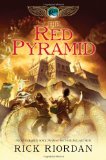
The Kane Chronicles
Reviewed June 5, 2010.
Disney Hyperion Books, New York, 2010. 516 pages.
Here is Rick Riordan's eagerly awaited start to a new series, this one based on the gods of ancient Egypt rather than the gods of ancient Greece. I'm going to happily encourage the fans of the Percy Jackson series to snap this one up, as it's very like that first series -- kids with superhuman powers, finding out the ancient myths are true, the world in danger of destruction, and action-packed adventure and narrow escapes.
The chapters in the book switch between the narration of a brother and sister, Carter and Sadie Kane. They hardly know one another, because since their mother's death, Sadie has lived with their grandparents in London, and Carter has roamed around the world, homeschooled by their archaeologist father. Sadie gets visitation with her father two days a year, and the book opens as one of those days begins.
Carter starts out the book. He says, "I guess it started in London, the night our dad blew up the British Museum."
The beginning of the book reminded me annoyingly of the first book, written by Rick Riordan, of The 39 Clues. We've got a brother and sister who learn they are part of a family with ancient power. They go all over the world, chased by enemies, looking for things to help them. Come on, I heard it before.
However, The Red Pyramid does grow more compelling and more fully fleshed out as it goes on. The power of the Kanes comes from their uniting two ancient bloodlines tracing back to the Pharaohs. Their father's attempt at the start of the book to "make things right" ends up unleashing five Egyptian gods and encasing their father in a golden tomb with the spirit of Osiris.
Their uncle Amos takes them in, to a powerful and magical mansion in New York City. But all too soon, Egyptian monsters come after them and burn down the mansion. The two start having strange spirit journeys in the night and discover strange new powers.
They go to Egypt and meet magicians from the House of Life. They learn that their father broke ancient rules of the House of Life by releasing the gods. They learn that the god Set is building a giant pyramid under Camelback Mountain in Phoenix and wants to unleash chaos onto the world. But in their attempt to learn to use their new powers and find a way to stop him, the House of Life stands opposed to them.
It's all well-written, with narrow escape after narrow escape. Sadie has an attitude that if you tell her to do something, she'll do the opposite -- which ends up serving her well. I like the chapter titles -- Things like "I Face the Killer Turkey," "Muffin Plays with Knives," "Leroy Meets the Locker of Doom," and "Our Family is Vaporized." Rick Riordan manages to keep the tone of modern kids and a bickering brother and sister, who learn to work together and deal with their amazing new powers and responsibility for the fate of the world.
You get to feeling for the Kane kids, too. It turns out that their mother's death had something to do with Egyptian magic, too. And now their father is captured by Set. People around them keep getting harmed. Will they be able to cope?
After reading this book, my reaction is only slightly different from my reaction after reading the first of The 39 Clues: not so much, "I love this book!" as, "I bet kids will love this book!"
I also understand why that little girl in the library yesterday asked for books about hieroglyphics! I have a feeling those books, and any others we have about ancient Egypt, are suddenly going to get checked out much more often!
I do like the way Rick Riordan calms the worries of parents who might not like their children reading about false gods. Toward the beginning, Carter and Sadie have a scene with their uncle:
"You're telling me our parents secretly worshipped animal-headed gods?" I asked.
"Not worshipped," Amos corrected. "By the end of the ancient times, Egyptians had learned that their gods were not to be worshipped. They are powerful beings, primeval forces, but they are not divine in the sense one might think of God. They are created entities, like mortals, only much more powerful. We can respect them, fear them, use their power, or even fight them to keep them under control --"
"Fight gods?" Sadie interrupted.
"Constantly," Amos assured her. "But we don't worship them. Thoth taught us that."
The book was too long for me -- made it that much harder to sustain my interest. But by the end, I was thoroughly engaged, and I did finish up the book completely satisfied at having spent the time with it. I'm sure its length will please the kids who are fans. More time to spend in the adventure!

